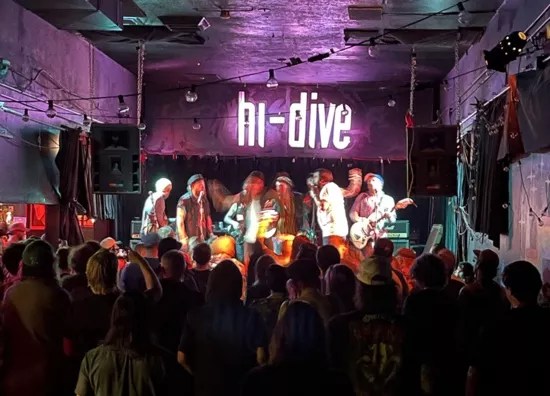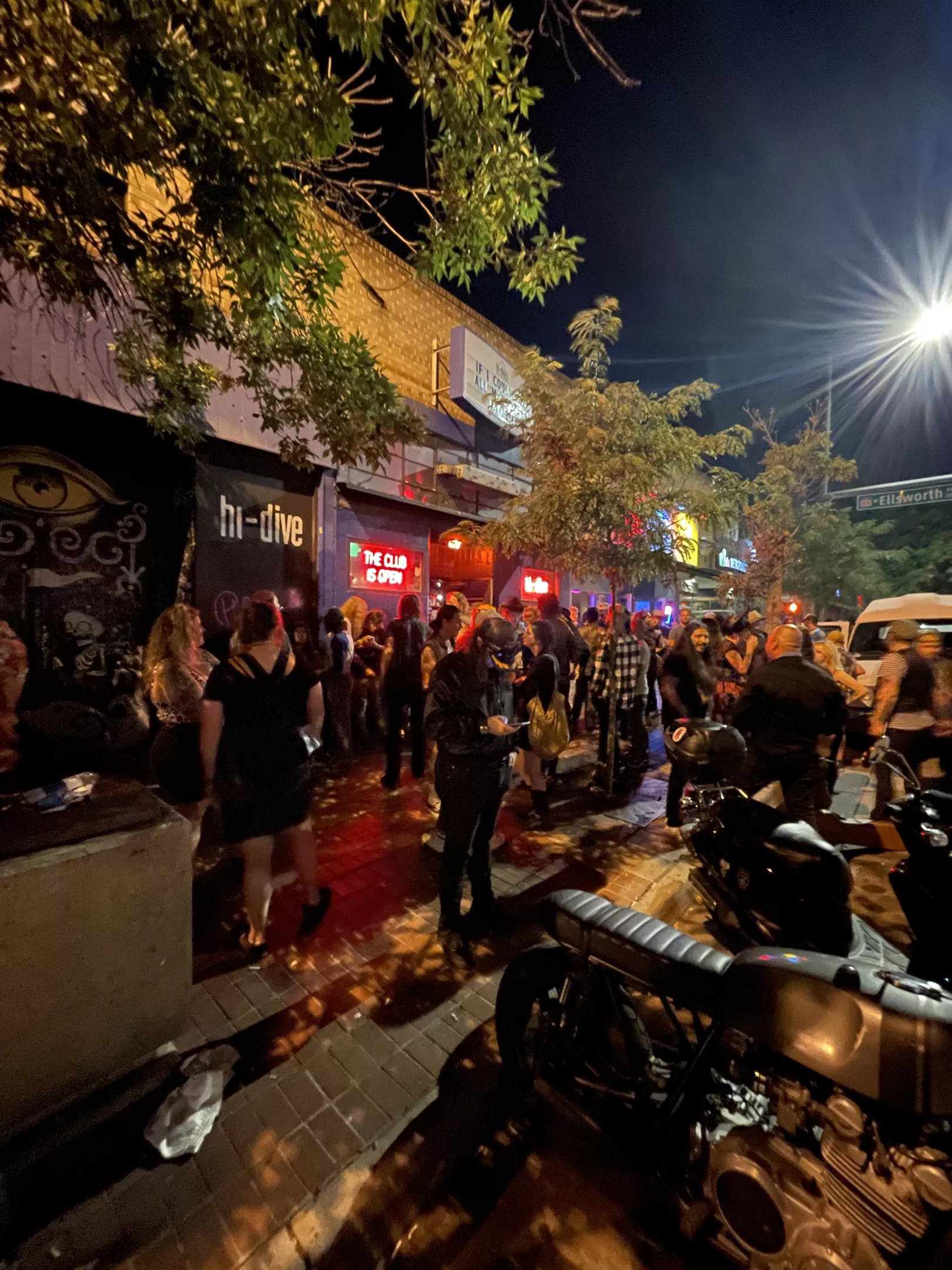
Courtesy Matty Clark

Audio By Carbonatix
Denver is constantly changing, but the hi-dive has been a dependable mainstay in the music scene for almost two decades. The venue has existed under that name since 2003, when Sputnik owners Matt LaBarge and Allison Housely bought the spot at 7 South Broadway, which had been 7 South and was then Quixote’s, from Jay Bianchi. (It was the second of six locations for Quixote’s, which finally closed for good in 2021; its last location, at 2014 South University, is now occupied by Gravel Pit.)
When LaBarge and Housely decided to sell in 2012, they turned to their employees to buy the hi-dive. Matty Clark – who had been working at the club since 2007 as well as at Lost Lake Lounge, then another LaBarge and Housely enterprise – was excited to take the helm. He had moved here from Miami in 2002 with a job already secured at Illegal Pete’s through his former roommate, who was friends with the chain’s founder, Pete Turner.
“I lived in Boulder, and I was going to sign a six-month lease in Denver and maybe try California,” Clark recalls. “But once I was living in Denver and playing in bands – there’s always been a really great local scene. And there still is. … Even as Denver’s been booming, the local scene has stayed tight-knit.”
Clark quickly became immersed in that scene, bartending at venues and playing in “hundreds” of bands (he currently plays in Bud Bronson & the Good Timers and despAIR jordan). But the hi-dive has been his passion from the beginning. “I had always wanted to work at the hi-dive because it was a cool spot,” he recalls. “When I hung the phone up after getting hired, I was like, ‘Oh, my God, I’m working at the hi-dive! This is amazing!'” he recalls.
His excitement has only been amplified through the past decade as owner: He’s celebrating his ten-year tenure with a sold-out concert on Friday, November 4, and the Zebroids, a band he played in back when he was a manager at the hi-dive, is reuniting for the occasion. “We decided to do one last show for the anniversary weekend,” he says. “We’re playing with this band the Spits; they’re just one of our favorites around here, and the Zebroids played with them at the hi-dive in probably 2013. I’m not sure they’ve been to Denver since then.”
On November 1, Clark posted on Instagram a throwback photo of a to-do list he wrote the day he acquired the venue, accompanied by a caption reading: “Ten years ago today I took over down here at the hi-dive. I woke up at 9 a.m. after closing the night before and ripped through this to-do list all day and worked the show that night. Never looked back, through a global pandemic even. When I die bury me at seven south.”
“I felt like I needed to hang on to that to-do list,” Clark says, “to remind myself like, ‘Hey, dude, you’re always going to be doing this, you’re always gonna have a to-do list. You’re gonna be tired. It’s gonna seem like a lot of it is insurmountable. But just remember, you did this.'”

The hi-dive has become a known first stepping stone for local bands.
Courtesy Matty Clark
When Clark bought the establishment with his then-partner and other employees (Clark is the majority owner), he swore the spirit of the venue would stay the same. And he kept that promise, making only some cosmetic changes and adding new amps. The hi-dive has always been known as a key step in Denver’s music scene, where nascent local bands can play their first real show and build a following. “My passion all these years is just the community,” he notes. “I love, I love music. I love local music. I love seeing all these people achieve things, like watching a band go from playing hi-dive to having 200 people in the audience, and then they’re headlining the Bluebird, or like how Nathaniel Rateliff went on to play Saturday Night Live. So it’s cool to think that we can be that place.”
And the bands appreciate it just as much as Clark does. The hi-dive’s relevancy was showcased on national TV in October, when Nathaniel Rateliff brought CBS Sunday Morning to the venue for his feature segment on the show. “We are always flattered and honored when Nathaniel includes us in things like the CBS interview,” Clark says. “He cut his teeth here, and he kind of grew up in the scene at the same time the hi-dive did, and we share a lot of memories together. He’s our favorite son.
“I was actually off-screen during some of that interview and got shushed by a producer,” he adds.
The pandemic made him realize how much the community relies on and loves the hi-dive, as well as how much responsibility the hi-dive has for that community. “We got such an outpouring of support from the community,” he says of the shutdown. “We didn’t even have to ask that much for help; we just got a lot of help. All these bands were wondering if they could do a livestream and donate the proceeds to keeping us afloat while quarantine was happening. And it really felt like that became bigger than just me and the other owners. This is what we do for a job, and it sort of became like, ‘Oh, man, we have a responsibility to the community to keep this place going, to give these people a place to create.'”
They did, and when the hi-dive could finally reopen, all the shows sold out.

Courtesy Matty Clark
Clark says that some of his favorite hi-dive memories involve taking staff trips to Las Vegas or Black Hawk, but in the end, most of the best moments have been just being at the venue at closing with the staff. “A lot of my favorite memories, I guess, are just at the end of the night, sitting around the bar after we finally get everybody out, and the band is packed up and out,” he says. “The staff is cleaning and everybody’s getting their shift beer, and just kind of smoking their cigarette and just recapping the night, talking about what other bands we’re excited to see and how good was the band tonight, what shows are coming up that you’re looking forward to.”
The past decade has been a labor of love, but that love has been returned. “I feel like at this point, we’ve established ourselves as kind of a staple of the local music circuit; we’ve been around for nineteen years,” Clark notes. “There’s not that many independent venues our size anymore. And even when you are independent in Denver, you’re still like at the mercy of AEG, Live Nation fighting over the city, and we’re just in there in the middle. So we always want to take care of bands, I’m sure people would take issue with that. But we try to pay well, and we want to give anybody a platform to do something creative, especially music. We’ve hosted all sorts of events – comedy events, drag shows; we’re pretty much up to do whatever. Being around as long as we have, and having a kind of pedigree of being where a lot of bands start out playing in town – I think that’s what keeps us relevant.”
Clark credits his bookers and staff with helping maintain that relevancy by welcoming genres that are becoming more popular in Denver, including metal. And Clark’s background in bands makes him a natural to lead an established local rock club.
He’s hoping to uphold the ethos of the hi-dive until he’s buried under it. “I want to be able to be a safe place where people can come and do their art and feel comfortable about it,” Clark says. “People will come and support them, and we’ll take a chance on anything.”
The tenth-anniversary concert on November 4 is sold out; find information about upcoming shows at the hi-dive, 7 South Broadway, at hi-dive.com.